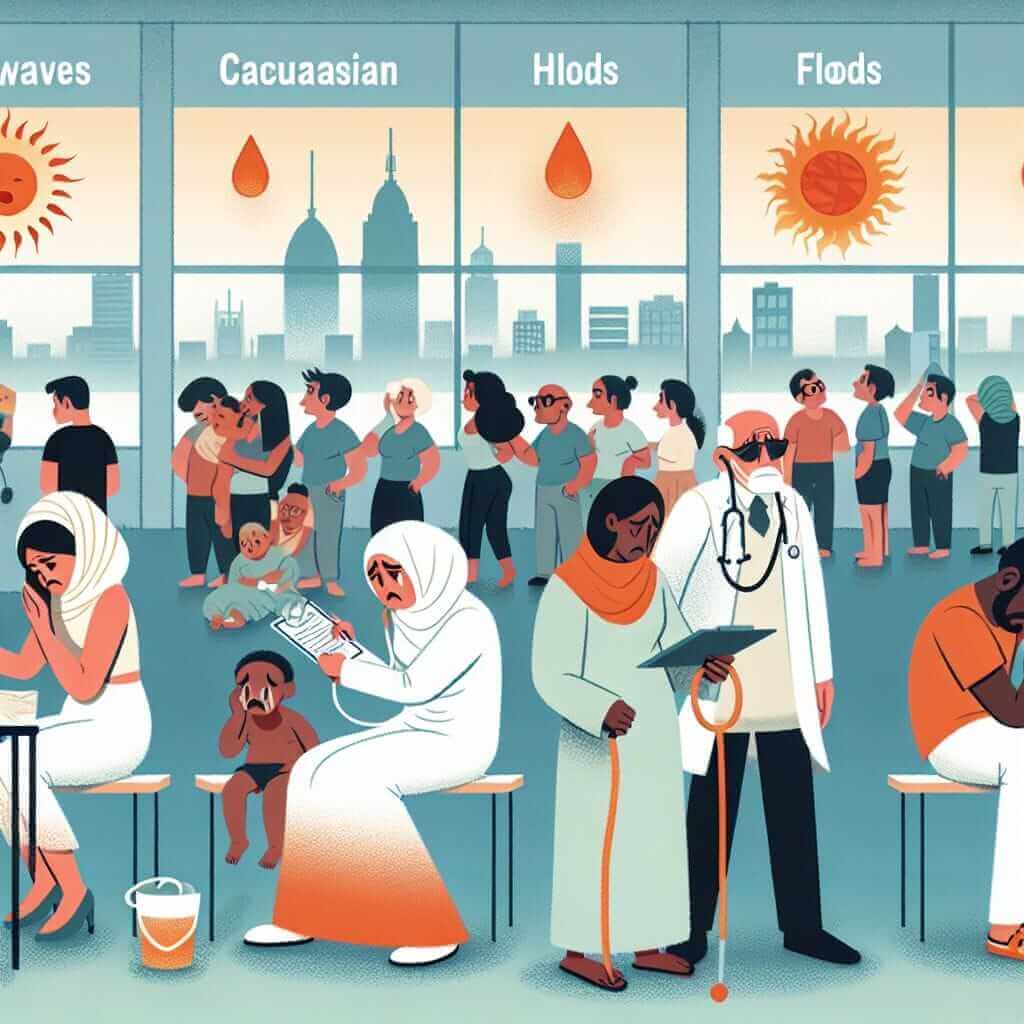The Reading section of the IELTS test is known to pose a significant challenge for many candidates due to its comprehensive and analytical nature. One recurring theme in recent years’ examinations has been the societal implications of climate change, especially on vulnerable populations. This article adopts a thorough approach to help you prepare for such topics, which have not only been frequent but have also been forecasted to maintain their relevance in future tests due to their global significance.
Social Implications of Climate Change on Vulnerable Populations
Reading Passage: Medium Text
The Devastating Social Impact of Climate Change on Vulnerable Populations
Climate change is a global phenomenon with far-reaching implications, particularly for vulnerable populations. These groups, often residing in developing countries, urban slums, and marginalized communities, face disproportionate challenges. The social ramifications span across health, livelihood, displacement, and social stability, making climate change a multifaceted crisis.
Health Impacts
One of the most immediate effects of climate change on vulnerable populations is the deterioration of health. Extreme weather events like heatwaves and floods can lead to waterborne and vector-borne diseases. Populations with limited access to healthcare services find themselves particularly at risk.

Livelihood Disruptions
The livelihoods of those dependent on agriculture and fishing—a significant number in developing regions—are threatened by changing climate patterns. Droughts, unpredictable weather, and decreasing fish stocks compel these communities to search for alternative—and often less stable—sources of income.
Displacement and Migration
Climate-induced displacement is a growing threat, forcing people to leave their homes due to irreversible environmental changes such as rising sea levels and desertification. This phenomenon creates ‘climate refugees’, putting additional pressure on urban areas and leading to socio-economic challenges within host communities.
Social Stability
Finally, the broader social stability can be compromised as resources become scarcer and competition for them increases. This tension can lead to conflicts, both within and between communities, further exacerbating the vulnerabilities of these populations.
Practice Questions
Type: Multiple Choice, True/False/Not Given, Matching Information, Summary Completion
-
What are some health impacts of climate change on vulnerable populations?
a. Increased access to healthcare
b. Reduction in waterborne diseases
c. Increased incidences of diseases like malaria
d. Improved living conditions -
True/False/Not Given: Vulnerable populations are primarily from developed countries.
-
True/False/Not Given: Climate change has led to a decrease in fish stocks affecting the livelihoods of those dependent on fishing.
-
Match the following information with the paragraphs:
- Health Impacts
- Livelihood Disruptions
- Displacement and Migration
- Social Stability
-
Summary Completion:
- Climate change leads to ____ among vulnerable populations by disrupting health, ____, and causing displacement.
Answer Key and Explanations
-
c. Increased incidences of diseases like malaria
(Explanation: The passage mentions that extreme weather events can lead to waterborne and vector-borne diseases, which includes malaria.) -
False
(Explanation: The text specifically states that vulnerable populations often reside in developing countries, urban slums, and marginalized communities.) -
True
(Explanation: The passage mentions that livelihoods dependent on fishing are threatened by decreasing fish stocks.) -
Match the paragraphs:
- Health Impacts (Paragraph 1)
- Livelihood Disruptions (Paragraph 2)
- Displacement and Migration (Paragraph 3)
- Social Stability (Paragraph 4)
-
Climate change leads to challenges among vulnerable populations by disrupting health, livelihoods, and causing displacement.
Common Mistakes to Avoid
- Misinterpreting Instructions: Students often misconstrue instructions, particularly in the True/False/Not Given questions. Ensure you read the statement carefully and correlate it precisely with the information in the passage.
- Time Management: Allocate time wisely for each section to avoid rushing through questions, which increases the possibility of mistakes.
Vocabulary Boost
- Disproportionate (adj.) /ˌdɪs.prəˈpɔː.ʃən.ət/: too large or too small in comparison with something else.
- Vector-borne (adj.) /ˈvɛktə-bɔrn/: referring to diseases transmitted by vectors, such as mosquitoes.
- Desertification (n.) /dɪˌzərtəfɪˈkeɪʃ(ə)n/: the process by which fertile land becomes desert, typically as a result of drought, deforestation, or inappropriate agriculture.
Grammar Focus
Conditional Sentences
Conditional sentences describe a conditional situation and a result.
- Zero Conditional: For general truths (e.g., If you heat water, it boils.)
- First Conditional: For real, possible future conditions (e.g., If it rains tomorrow, we will cancel the trip.)
- Second Conditional: For unreal, hypothetical present or future conditions (e.g., If I were you, I would study harder.)
- Third Conditional: For unreal, hypothetical past conditions (e.g., If I had seen you, I would have said hello.)
Practical Tips for a High IELTS Reading Score
- Practice Regularly: Consistent practice hones your skills and familiarizes you with the test format.
- Expand Vocabulary: A robust vocabulary enhances comprehension and accuracy.
- Note Key Ideas and Supporting Details: Focus on understanding main ideas and supporting details to answer questions efficiently.
- Use Context Clues: Derive meanings of unfamiliar words using context clues.
For more information and relevant practice exercises, you can read related articles on our site: Social Implications of Climate Change on Developing Countries, Social Implications of Climate Change on Urban Environments, and The Effects of Urban Heat Islands on City Living.
By accurately understanding and practicing these elements, you can significantly improve your performance in the IELTS Reading section. Happy studying!